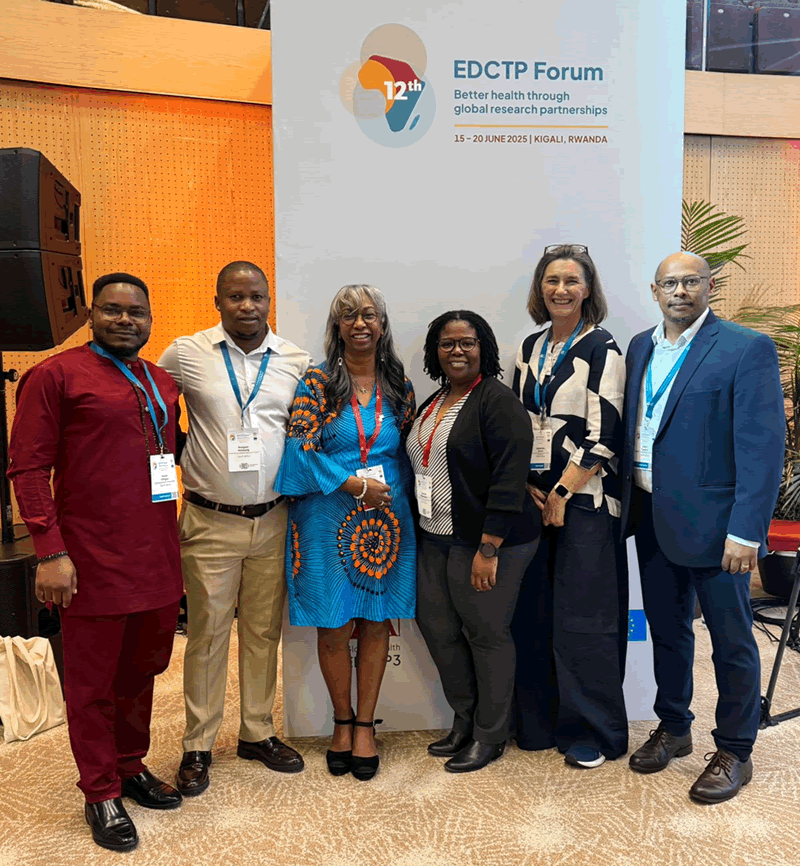At the South African Medical Research Council, we celebrate the capacity of collective minds working towards a common goal of improving health for all. To that end the organisation values and builds partnerships with many stakeholders at local, national, regional and international levels. One such example is with the European and Developing Countries Clinical Trials Partnership (EDCTP), which is a partnership between the governments of 15 European and 30 African countries and the European Commission, working together to alleviate the health and economic burden of infectious diseases in Africa. Through its evolution, EDCTP has been driven by the infectious disease priorities of sub-Saharan Africa and the need to develop African countries’ capacity to collectively address these priorities in the future.
Hosted by the Ministry of Health of Rwanda and the Rwanda Biomedical Centre and jointly organised by Global Health EDCTP3 and the EDCTP Association, The Twelfth EDCTP Forum took place from the 15-20 June 2025, at the Kigali Convention Centre in Rwanda. The theme for the forum was “Better health through global research partnerships” and aimed to showcase the impact of the EDCTP programmes over the last two decades. This gathering presents a unique platform for a diverse set of stakeholders, including representatives from research institutions and universities, the larger scientific community, healthcare providers, governments, regional bodies, regulators, civil society, and public and private research and development partners, for the presentation and discussion of cutting-edge research addressing the burden of poverty-related and neglected infectious diseases in sub-Saharan Africa, together with the capacity development and networking activities to support this goal.
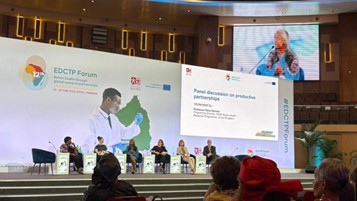 Participating in a plenary panel discussion on ‘Productive partnerships’ was the SAMRC’s Vice-President Prof Liesl Zühlke, who said “One of the SAMRC values is partnering; and thus, we see collaboration, engaged scholarship and scientific citizenship as core to our mission and vision.” Prof Zühlke gave insight into some cascading strategies that are integral to the work of the organisation, such as importance of community-led priority setting and two-way knowledge flows, which involves investment in strengthening local research capacity, and building of strong multidisciplinary teams. She also spoke on institutionalised co-creation, and the involvement of our executive authority as important stakeholders from the outset in defining priorities, developing interventions, and establishing evaluation metrics. “We work alongside our National Department of Health and Department of Science, Technology and Innovation to identify local, regional and global challenges, with this going beyond joint funding, and speaks to mutual benefit with equity as a design principle, defined by close working relationships and shared responsibility, together with accountability to communities not just donors, with embedded community-driven evaluations and knowledge translation and dissemination activities”, added Prof Zühlke.
Participating in a plenary panel discussion on ‘Productive partnerships’ was the SAMRC’s Vice-President Prof Liesl Zühlke, who said “One of the SAMRC values is partnering; and thus, we see collaboration, engaged scholarship and scientific citizenship as core to our mission and vision.” Prof Zühlke gave insight into some cascading strategies that are integral to the work of the organisation, such as importance of community-led priority setting and two-way knowledge flows, which involves investment in strengthening local research capacity, and building of strong multidisciplinary teams. She also spoke on institutionalised co-creation, and the involvement of our executive authority as important stakeholders from the outset in defining priorities, developing interventions, and establishing evaluation metrics. “We work alongside our National Department of Health and Department of Science, Technology and Innovation to identify local, regional and global challenges, with this going beyond joint funding, and speaks to mutual benefit with equity as a design principle, defined by close working relationships and shared responsibility, together with accountability to communities not just donors, with embedded community-driven evaluations and knowledge translation and dissemination activities”, added Prof Zühlke.
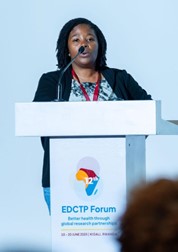 Dr Duduzile Ndwandwe, a Specialist Scientist at Cochrane South Africa (CSA), presented at the scientific symposium “Improving Our Preparedness Capabilities for Global Response to Infectious Diseases”, with her talk entitled, “Strengthening African Funder Coordination: The Establishment of the GloPID-R Africa Regional Hub,” highlighting the work done towards aligning funders to support regional outbreak response. She also participated in the Africa CDC panel on “How can Africa-led R&D transform health innovation on the continent?”, while also serving as a “Meet-the-Expert” speaker on clinical trial registration, drawing on the work done on the Pan African Clinical Trials Registry (PACTR) and CSA. Dr Ndwandwe said “It was gratifying to see PACTR mentioned in the opening plenaries as a testament to my team, who work tirelessly to keep the Registry going and relevant in the evolving research landscape. Strategic side meetings have been central to this Forum, strengthening ties with regional partners and advancing key initiatives under the GloPID-R Africa Hub and PACTR. These engagements continue to be crucial for establishing collaborative, African-led research ecosystems that foster transparency, preparedness, and lasting impact.”
Dr Duduzile Ndwandwe, a Specialist Scientist at Cochrane South Africa (CSA), presented at the scientific symposium “Improving Our Preparedness Capabilities for Global Response to Infectious Diseases”, with her talk entitled, “Strengthening African Funder Coordination: The Establishment of the GloPID-R Africa Regional Hub,” highlighting the work done towards aligning funders to support regional outbreak response. She also participated in the Africa CDC panel on “How can Africa-led R&D transform health innovation on the continent?”, while also serving as a “Meet-the-Expert” speaker on clinical trial registration, drawing on the work done on the Pan African Clinical Trials Registry (PACTR) and CSA. Dr Ndwandwe said “It was gratifying to see PACTR mentioned in the opening plenaries as a testament to my team, who work tirelessly to keep the Registry going and relevant in the evolving research landscape. Strategic side meetings have been central to this Forum, strengthening ties with regional partners and advancing key initiatives under the GloPID-R Africa Hub and PACTR. These engagements continue to be crucial for establishing collaborative, African-led research ecosystems that foster transparency, preparedness, and lasting impact.”
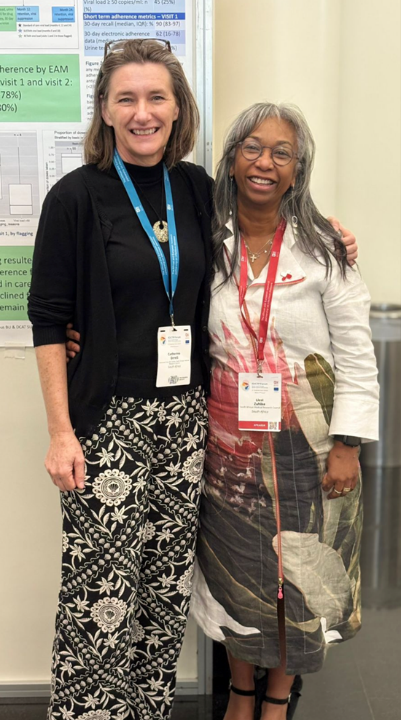 Also in attendance, was the HIV and Other Infectious Disease Research Unit’s (HIDRU) Director, Prof Catherine Orrell, attending the forum as a recipient of an EDCTP2 Senior Fellowship, together with Trainee Fellow, Dr Olaposi Olatoregun, from Abuja, Nigeria. They presented a poster on the primary outcomes of a study, which involved “Improving RETention and viral load outcomes for people taking Antiretroviral therapy (ART) through early IdentificatioN of missed doses (RETAIN)”. RETAIN is a cohort study exploring detailed adherence metrics in people on ART from a large clinical trial in a community clinic in Cape Town. “I enjoyed this forum as it is focussed on African researchers and showcased research capacity and skills development on our continent, with a keen focus towards building and enhancing our clinical trials infrastructure. I was also particularly interest in the session on promoting efficiency in Ethics and Regulatory review: opportunities to streamline and harmonise the administrative processes that are critical to, but often delay, the running of a clinical trial”, added Prof Orrell.
Also in attendance, was the HIV and Other Infectious Disease Research Unit’s (HIDRU) Director, Prof Catherine Orrell, attending the forum as a recipient of an EDCTP2 Senior Fellowship, together with Trainee Fellow, Dr Olaposi Olatoregun, from Abuja, Nigeria. They presented a poster on the primary outcomes of a study, which involved “Improving RETention and viral load outcomes for people taking Antiretroviral therapy (ART) through early IdentificatioN of missed doses (RETAIN)”. RETAIN is a cohort study exploring detailed adherence metrics in people on ART from a large clinical trial in a community clinic in Cape Town. “I enjoyed this forum as it is focussed on African researchers and showcased research capacity and skills development on our continent, with a keen focus towards building and enhancing our clinical trials infrastructure. I was also particularly interest in the session on promoting efficiency in Ethics and Regulatory review: opportunities to streamline and harmonise the administrative processes that are critical to, but often delay, the running of a clinical trial”, added Prof Orrell.
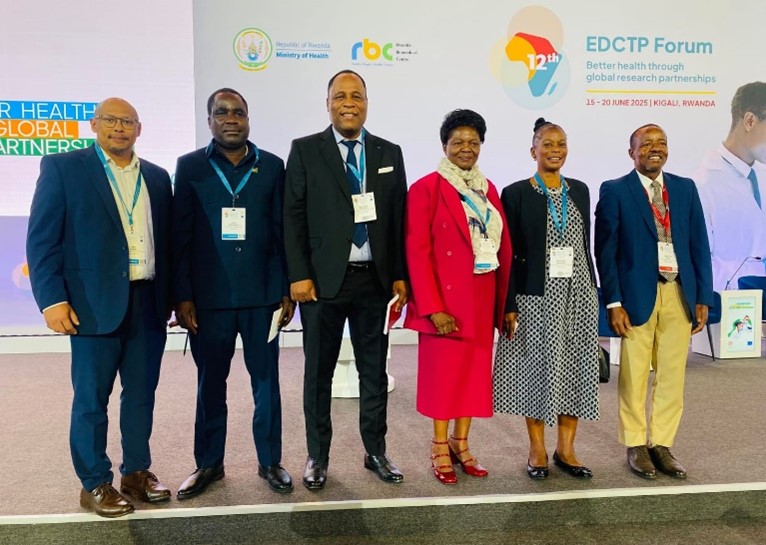
Prof Andre Loxton, Chief Specialist Scientist at the Stellenbosch University / SAMRC Centre for TB Research Unit (CTR), attended the forum alongside his postdoctoral fellow, Dr Bongani Motaung. They participated in the scientific session, ‘Leveraging innovative peer-to-peer, North-South partnership’ in a presentation by Dr Francisco Saúte (co-ordinator of the Trials of Excellence in Southern Africa (TESA) regional network). Prof Loxton said “I am the leader of the TB studies for the TESA network, which includes capacity development as a main priority of postgraduate students and project staff. We also featured a poster by the Tuberculosis Vaccine Initiative (TBVI) that highlighted our involvement in ongoing vaccine studies. The forum is a wonderful opportunity to engage with long time collaborators but also to learn from the broad scope of ongoing work and partner with research for new funding applications going forward. Several ideas were exchanged and contact details of researchers collected for follow up discussions.”
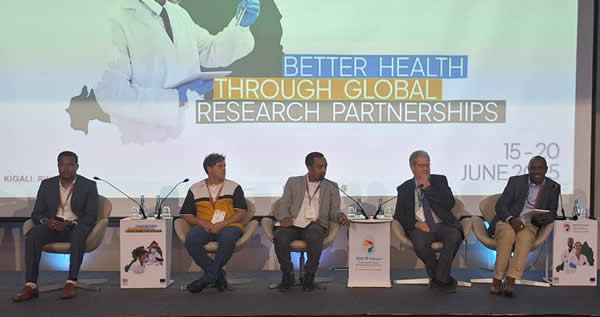
Dr André Rose, Interim Director of the South African Population Research Infrastructure Network (SAPRIN) participated in a workshop hosted by the African Population Cohort Consortium, where he presented on the potential application of the SAPRIN model to other Health and Demographic Surveillance Systems (HDSSs). His presentation entitled, “From People to Policy: Creating a Research Infrastructure That Serves South Africa” underscored the value of SAPRIN’s integrated, longitudinal data infrastructure in advancing health research and informing policy across varied African contexts. He shared perspectives on how the model’s scalability and adaptability can support evidence-based decision-making, strengthen regional research capacity, and foster innovation in public health surveillance. “The conference also provided a valuable opportunity to build collaborations with other African HDSSs and expand professional networks with researchers and institutions committed to improving health outcomes across the continent”, added Dr Rose.
Prof Zühlke, acknowledged all the partners, including the EU, EDCTP 3 and Horizon Europe for supporting South African researchers at this challenging time, saying, “As we talked this week about the importance of partnerships, we cannot ignore the fact that partnerships built up over decades are under direct threat and the institution of global health is being targeted like never before. We face in South Africa an orchestrated assault on the research ecosystem of our country-targeting the most vulnerable populations living with HIV and TB, decimating science infrastructure, interrupting research capacity development and most importantly, deliberately ending life-saving programmes. The cost in terms of lives lost, and science interruption will be enormous”.
The SAMRC, as custodian for health research in our country, has played an important role acting as a central repository to quantify the impact on our research ecosystem, chairing ministerial task teams to respond to this crisis and hosting emergency funding forums on behalf of and for the entire county. “We must strive to make this time an opportunity to ensure a resilient African-led research ecosystem putting partnerships built on equity, trust and justice at the core of health research”, concluded Prof Zühlke.
Read more about the 12 EDCTP Forum | HERE

